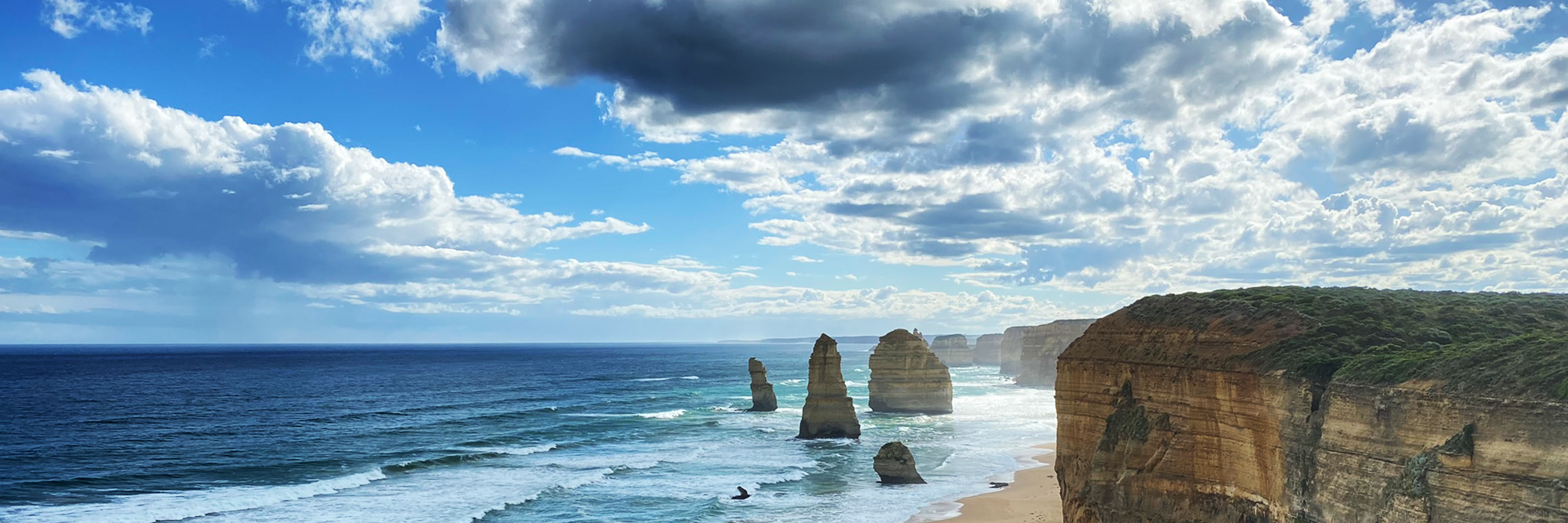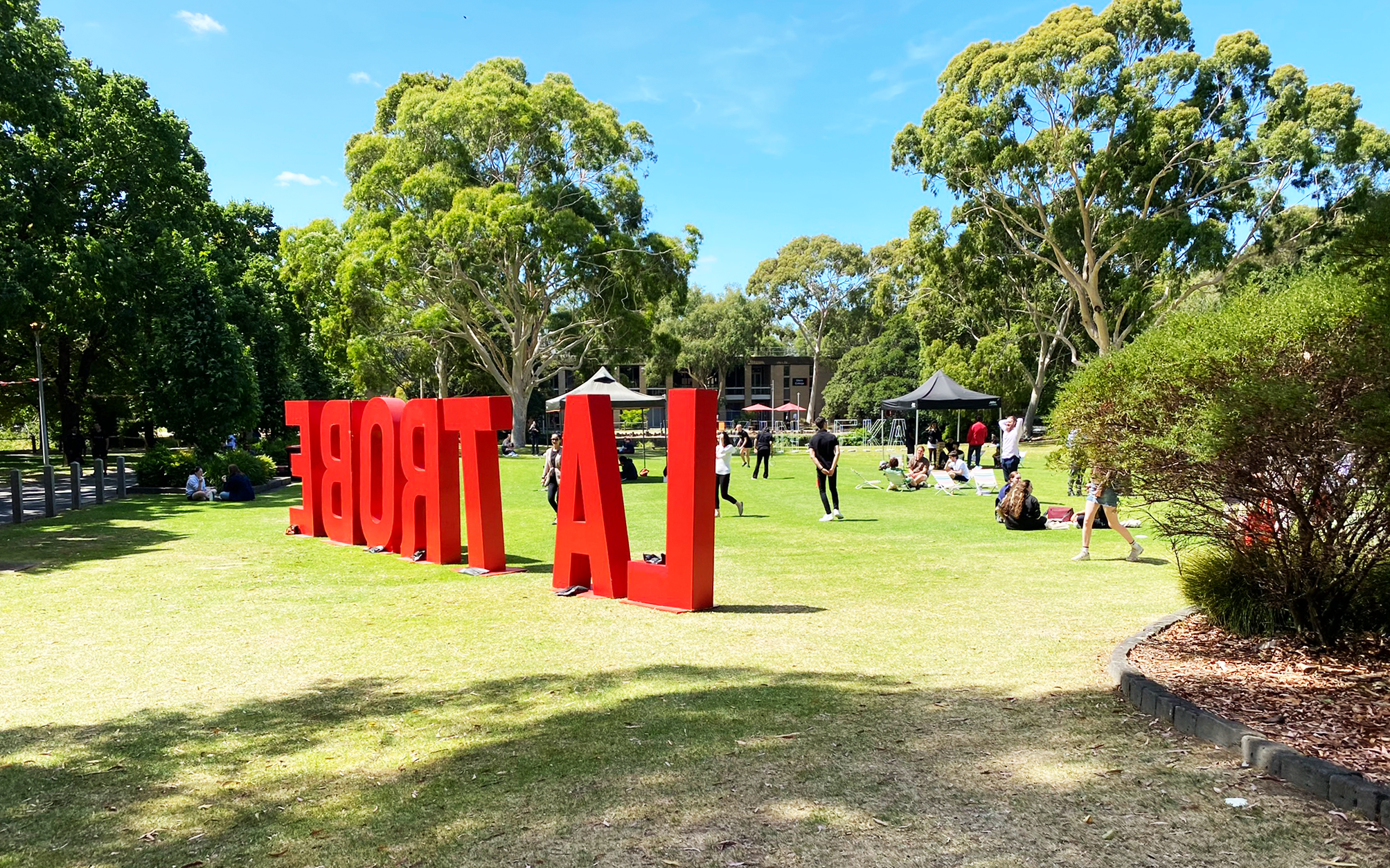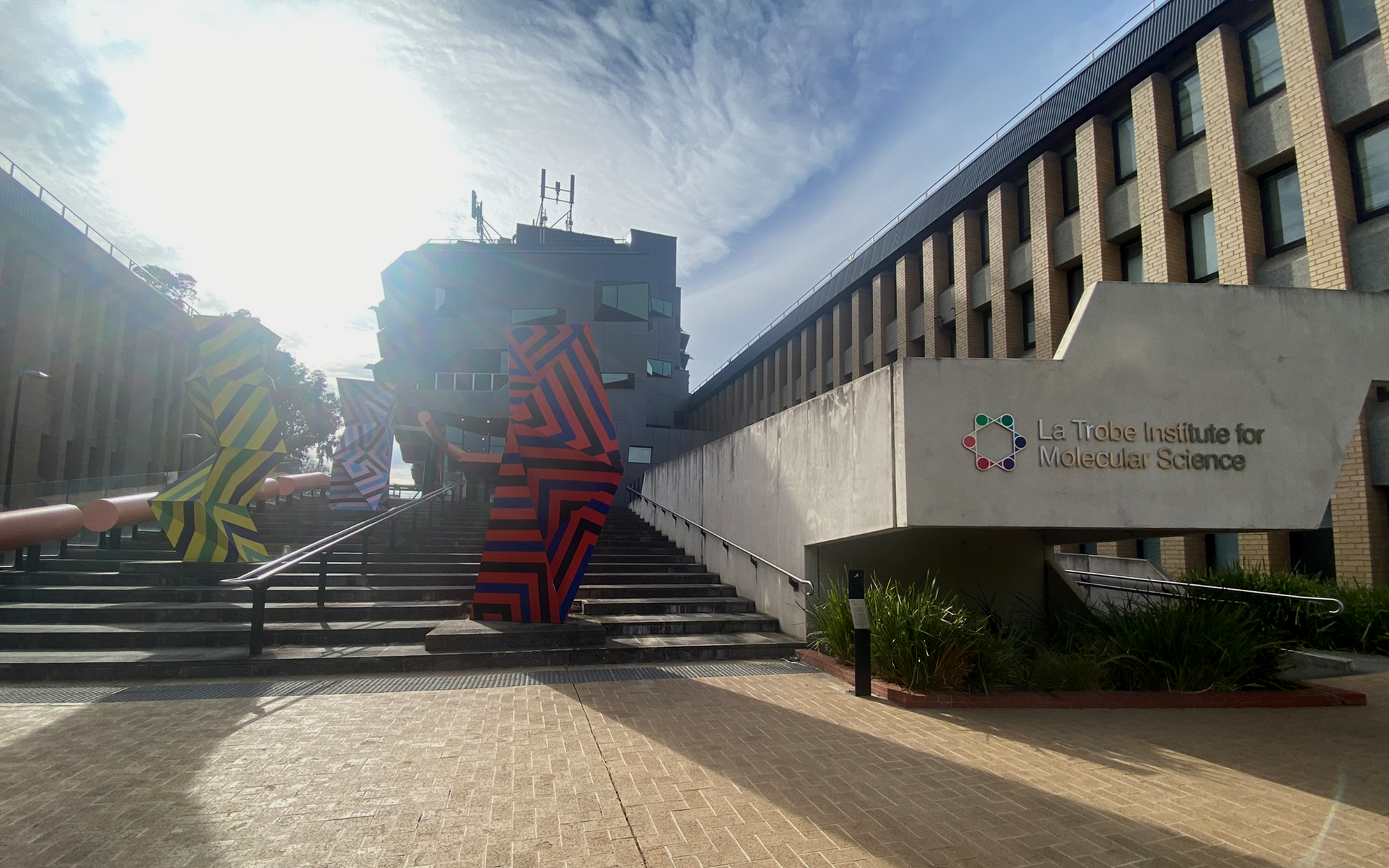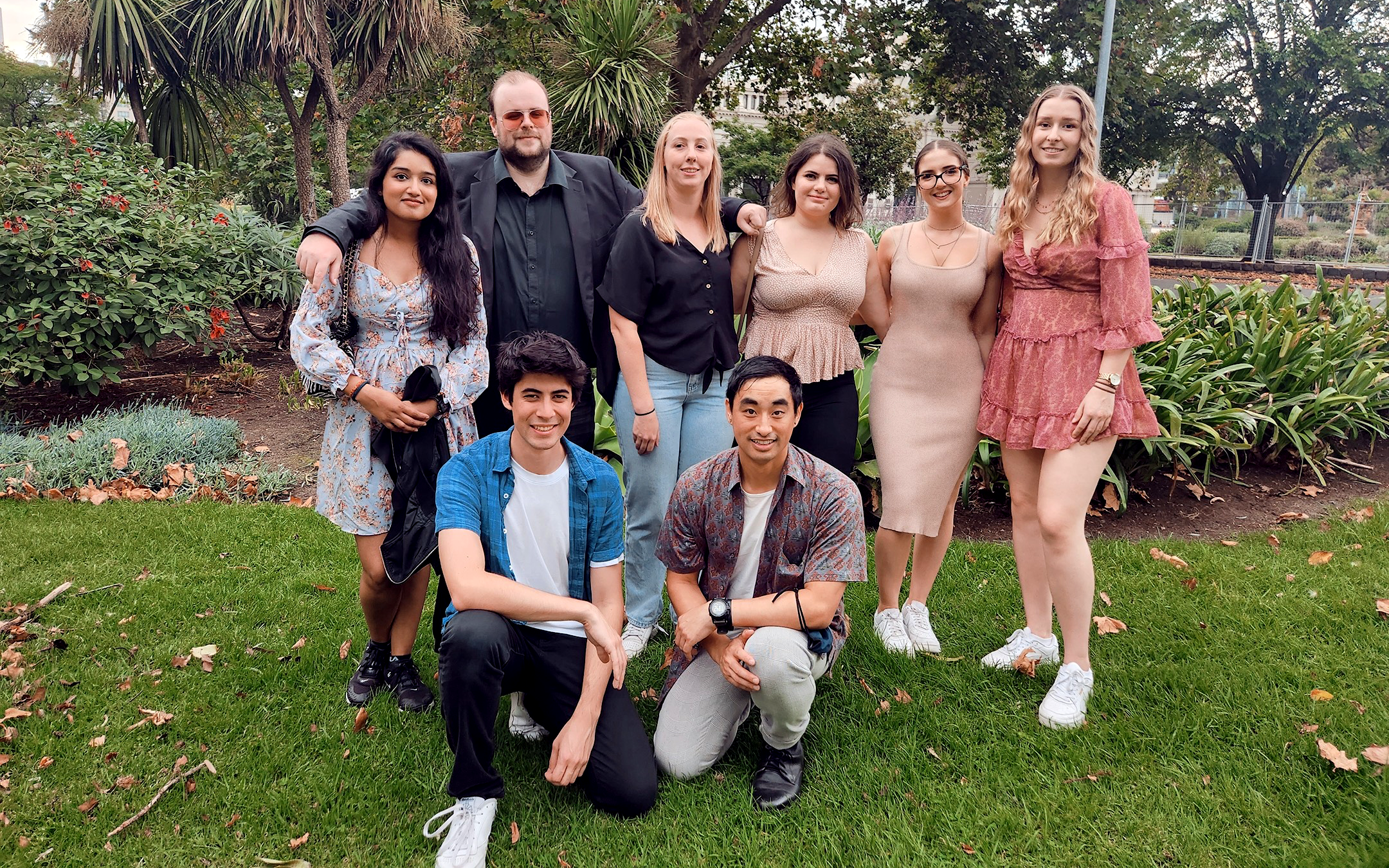Bachelor's thesis in Australia
Rina Tetaj spent six months conducting research at the La Trobe Institute for Molecular Science in Melbourne.
Field of study: BSc Chemistry (Materials)
Stay abroad: BSc thesis
Host institution: La Trobe University
Semester: Spring 2023
What made you decide, what motivated you to go abroad?
As someone who enjoys exploring novel and diverse experiences, I have always desired to study abroad, immersing myself in an unfamiliar country and culture. So, when the opportunity came up to go abroad for my thesis, I jumped at it without hesitation.
Why did you choose your host institution/country?
I informed my Swiss supervisor Sina about my interest in going abroad after completing my studies. She then asked if I would like to conduct my thesis overseas, to which I immediately agreed. I was open to any country that was non-German speaking, and particularly keen on exploring a destination outside of Europe. Eventually, La Trobe University in Melbourne, Australia was chosen as my destination, thanks to Sina's connection with my main supervisor there. Sina reached out to him to inquire if there was a project I could work on, and fortunately, there was!
I accepted the project for several reasons. First, it provided an opportunity for an exchange experience. Second, I was excited about utilizing the Australian Synchrotron Beamlight for my research. Third, the project focused on biochemistry rather than my field of study, chemistry or material science, allowing me to acquire new skills and expand my knowledge. Moreover, the project was centered around a captivating and significant topic. Finally, Australia's unique charm and nature, and its considerable distance from my home, made it an appealing country to explore.
What is your everyday life like? What does a typical day at the host institution look like?
I would get up every day around 8 am and take a 10 min. walk to the agora center (which is the inner campus center) for my morning orange juice and then head to the lab. A typical day in the lab involved reviewing my plans, performing planned experiments, and documenting my progress. Around noon, I would take a lunch break and usually choose from the delicious and reasonably priced food options at the agora center.
With flexible working hours, I aimed for consistency and typically continued my work until 5 pm. At the end of the day, I tidied up the lab, returned to my office space, and devoted time to analyzing data or preparing for the following day. However, for atomic force microscopy (AFM) measurements, I had to travel to another university, which required a 1.5-to-2-hour train journey. Once there, I would settle into the cozy AFM room, conduct my probe imaging, and occasionally take a break in the CBD for dinner before returning to the university campus where I resided.
Thursday afternoons were reserved for a one-hour lab meeting, where all lab members, including five PhD students, one master's student, one honors student, and two group leaders (one being my supervisor), would gather. During these meetings, one of us would present our work and treat everyone to some cake. In the afternoon, I would have a one-on-one session with my supervisor to discuss the weekly results and address any questions or concerns.
In the evenings, I would go home, cook dinner, and have enjoyable conversations with my flatmates. On Monday evenings, I had karate training, and on Tuesdays and Thursdays, I participated in Taekwondo sessions at the university. However, the Taekwondo sessions were only available during the first month and the final month, as club activities were paused for a three-month university vacation. Besides that, I often took leisurely walks in the beautiful university campus, which was surrounded by a peaceful natural park.
During weekends, I usually visited the City Business District (CBD), taking advantage of the numerous free activities available or simply to soak in the vibrant city life of a metropolis and discover new restaurants. On Sundays, I would explore the Sunday university campus market and go for some shopping, which required a 20–30-minute walk to the nearest shopping center.
Tell us about your research and your research findings during your residency.
My research project focused on the role of amyloid protein aggregation in COVID-19. Specifically, I aimed to investigate whether a protein from the SARS-CoV-2 proteome could self-assemble into amyloids and analyze their structure. Previous bioinformatic studies had identified a protein with a high likelihood of forming amyloids. Gemma, a postdoctoral researcher from La Trobe, expressed the protein for me, and I conducted experiments using the limited amount of protein available.
Additionally, I investigated how self-assembly of two different peptide sequences affected cultured brain cells. One peptide came from the protein mentioned earlier, while the other came from a different COVID-19 protein that was less harmful to the cells. The purpose was to understand the outcomes of fully monomerized self-assembly and evaluate its toxic effects on the cultured brain cells.
To conduct my research, I performed several measurements. I used techniques such as atomic force microscopy and transmission electron microscopy to examine the morphology of the amyloid structures. Fluorescence measurement with a specific dye allowed me to analyze the kinetics of amyloid formation. Circular dichroism and small- and wide-angle X-ray scattering with synchrotron radiation were used to verify the amyloid structure (secondary structure). For the toxicology aspect, I set up three different assays: a cell viability assay, a Seahorse assay to assess mitochondrial activity, and an autophagy assay.
During the study, I discovered an improved method for solubilizing and initiating self-assembly from monomers in a more controlled manner in different buffers for the peptides. These changes revealed differences in amyloid assembly compared to the initial solubilization, which included heating. Moreover, these differences showed varied effects on cultured brain cells, including increased autophagy and mitochondrial activity.
Importantly, the chosen expressed protein did indeed form amyloid fibers as part of the research findings.
What surprised you the most about your stay abroad?
I was surprised by my “Swiss” naivety, I trusted everything I found on the internet, especially when it came to finding accommodation. I had to learn to be more critical.
I was amazed at how quickly my English skills improved during my stay.
I didn't expect to miss bread so much.
I discovered how much I enjoyed living in a vibrant city like Melbourne. The multicultural and friendly atmosphere of the city left a lasting impression on me, and I had the opportunity to meet many wonderful people.
The beginning was tougher than I expected. It took some time to make friends, navigate the city, and find my way around. Settling in required some time.
Saying goodbye was harder than I imagined. The bonds I formed and the experiences I had made it difficult to part ways.
I underestimated the impact of jet lag, and it took me at least a week to adjust to the 10-hour time difference.
Solo travel turned out to be something I thoroughly enjoyed.
Working on a hypothetical project at the university was a unique experience. I had to read extensively and learned a lot.
I realized the importance of being persistent and self-motivated in my work. Independence became a valuable skill I had to develop.
Getting started on my project was more difficult then I thought, as I had limited knowledge and little support aside from my supervisor. The learning curve proved to be more challenging than I expected. Additionally, my project goals changed significantly as the work progressed, and the process of writing the thesis was highly stressful.
And lastly, I came to realize how large Australia and Melbourne actually are. I had to accept that a 20 min. walk is a short walk.
What tip would you like to give to future exchange students?
Consider reaching out to locals for assistance in finding suitable accommodation. Although I encountered a scam upon arrival, connecting with residents can help to avoid such incidents. Additionally, living closer to the CBD offers the advantage of easy access to various attractions and opportunities to explore the vibrant city, so my advice is to look for accommodation in a livelier area that make it easier to meet new people.
Instead of opting for university accommodation with solely international students, you might consider renting a room in a shared house with locals. This arrangement can provide a more immersive cultural experience and opportunities to build connections with people from the area.
Take the opportunity to enhance your social circle by joining clubs, societies, or meetup groups where you can meet new people and engage in shared interests.
Depending on your location, it might be worth saving up some money to purchase a car during your stay, which you can sell again at the end of your stay. Having a car would provide the freedom to explore and navigate your surroundings more conveniently, especially in larger cities.
Consider delaying the start of your project and allocating 1-2 weeks to travel around the country before beginning your work.
When planning to write your thesis at a university, take into consideration the semester starts days to avoid spending most of your time during long vacations. As many people, including those in the lab, tend to take vacations during this period and the campus can be very empty.
What were the highlights of your stay?
One of the highlights of my stay was attending a student conference for PhDs and postdocs in colloid and surface science in Melbourne. Over the course of four days, I had the opportunity to meet numerous people and became inspired by their interesting PhD projects and extend my network. We also had a great night out together, creating memorable experiences.
Another memorable experience was visiting the Melbourne Synchrotron Center for two days, where I felt like I was in a spaceship.
I took advantage of the opportunity to attend as many seminars at La Trobe as possible, expanding my knowledge even further.
Since I was already in Australia, I took the opportunity after submitting my thesis to go on an exciting three-week backpacking trip with Kiwi Experience. Starting from the top of the North Island and making my way down to the bottom of the South Island in New Zealand, I fully enjoyed the country's best attractions. It was not only a chance to explore but also to obtain a new visa to re-enter Australia.
In addition, I explored Victoria by visiting charming small towns, driving along the iconic Great Ocean Road, observing adorable mini penguins and Koalas, and visiting stunning natural hot springs. There were also countless activities to enjoy in Melbourne, such as attending a lively Greek festival, exploring vibrant night markets, attending concerts with massive crowds (110 000 pp), or simply relaxing on the beach (whenever the weather permitted, although we didn't have many sunny days during the weekend).
Towards the end of my journey, I went on a solo backpacking trip in Queensland for 2.5 weeks. I visited major destinations from Brisbane to Cairns, where I experienced stunning white beaches, the world's oldest rainforest, and had the incredible opportunity to go scuba diving and snorkeling in the Great Barrier Reef and fulfilling a dream by skydiving and experi-encing the Reef from above.
The best part of these experiences was meeting people from all around the world and forming meaningful friendships. We have made plans to visit each other in our respective home countries in the future.
Unsere Studierenden profitieren von der internationalen Vernetzung der Hochschule für Life Sciences. Ein Auslandsaufenthalt bei unseren Partnerschulen ist bei Bachelor- wie auch Master-Studierenden sehr begehrt. Nicht nur, um den persönlichen Horizont zu erweitern, sondern auch, um neue soziale und kulturelle Kompetenzen zu erwerben.
Im Rahmen unseres Masterprogramms können ausgewählte Studierende durch ein zusätzliches Semester an einer unserer Partnerschulen, zwei Diplome erhalten. Das Double-Degree Programm ist besonders attraktiv für Masterstudierende, die anschliessend eine Promotion anstreben. Weitere Details zum Double-Degree-Programm finden Sie hier.



